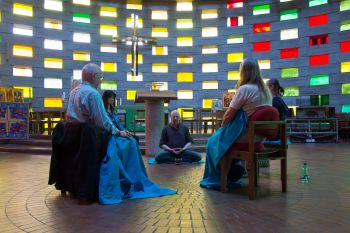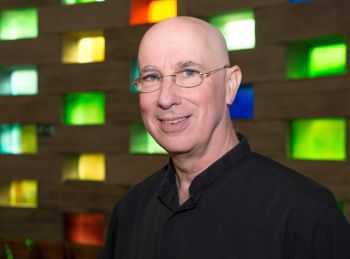“I wanted something that embraces diversity and brings people together”
By: Jacqui Bealing
Last updated: Thursday, 14 December 2017

Rev Chris McDermott helps dispel frenetic energy with mindfulness meditation in the Meeting House

Revd Chris McDermott, Lead Chaplain for the University of Sussex
Rev Chris McDermott, University of Sussex Lead Chaplain,talks about how to cross religious boundaries.
A group of 30 people gather beneath the “eye” of the Meeting House, the coloured skylight in the ceiling of the University of Sussex campus’s ecumenical circular building, and close their own eyes.
Under the guidance of the University’s Lead Chaplain Rev Chris McDermott, they’re encouraged to be aware of the moment, to feel the solidness of the chair they’re sitting on and the floor beneath their feet, and to “take refuge in every breath”.
These regular “mindfulness” sessions, ever growing in popularity, are one of the innovations that Chris has introduced since arriving on campus in 2014. His aim is not just to help those sitting in his chapel deal with their excess frenetic energy. He would like people from all faiths and religions to feel able to join in.
“I wanted something in place that embraces diversity and brings people together around a common focus,” he says. “In this case, it’s the value of enlarging the space within themselves. Frenetic energy is the stuff that fills us up and distracts us. Mindfulness to me isn’t about reducing anxiety or stress – it’s about enlarging the container so that it barely affects us.”
His mission in the broadest sense is to continue to bring together people of different faiths. For the recent celebration of the 50th anniversary of the Meeting House, Chris temporarily removed the Christian icons so that attendees would feel comfortable and could experience the building in what he calls its “stark, gracious simplicity - as it was meant to be experienced”.
During One World Week earlier this year, the Meeting House was the venue for a discussion on Humanity Beyond Belief, co-hosted by the Chaplaincy, the student Co-Exist Society and the Islamic Society. And every week the Theology Café brings together people of different faiths to explore what can be done collaboratively to establish compassionate spaces on campus.
This desire to be both expansive and inclusive has been a feature of Chris’s life and career. Although in the past he has worked as an Anglican curate in a parish, he finds it far more invigorating to be involved in the wider community.
For 26 years American-born Chris worked in London’s East End as a community mediator, trying to build a culture of peace and non-violence in some of London’s most racially divided and deprived neighbourhoods.
Despite the enormity of the task, he feels he achieved some creditable success. “We were giving young people the skills to be peacebuilders and to help their peers resolve conflicts. Some of them even went on international conferences on peacebuilding. They retained that sense of a larger world and one’s responsibility to make it better.”
Previous to this, he worked in adult education colleges in Zimbabwe (or Rhodesia, as it was then) and South Africa, training ministers who were working in churches in the black community, and witnessed at first hand the indignity of apartheid.
“I remember walking around Pretoria with a black colleague looking for somewhere to eat and there was nowhere for us to sit together. As I came to the end of my time there, one elderly gentleman stood up in the class and thanked me. He said I treated them like they were human.”
Growing up in Niagara Falls and New York, Chris had been aware of racial tensions in his own communities. But it was the shooting of civil rights leader Martin Luther King in 1968, followed just months later by the assassination of Senator Bobby Kennedy, which inspired him to do something with his life “and make the world a better and more just place”.
Initially he considered becoming a civil rights lawyer and got involved in politics as a volunteer campaigning for progressive Democrat candidates in New York. But then he encountered the story of St Francis of Assisi, who advocated ecology and a simple life, and wondered if he should take the vows of poverty, celibacy and obedience necessary to be a Franciscan friar.
Although in the end he took a different Christian route, he has recently been professed as a tertiary Franciscan. “I am part of a community that takes its inspiration from the ethos of the teaching of St Francis – the practice of justice, and the life of simplicity.”
With a post-graduate degree in multicultural studies, and an academic interest in working across all kinds of boundaries and faiths, it was Sussex’s emphasis on diversity that attracted him to apply for the chaplaincy role.
It was also the reason why he knew that mindfulness, derived from the Buddhist practice of mediation, would be well received.
A member of the Wild Goose Zen Sangha, a Soto Zen group in the White Plumb lineage which includes Buddhists and Christians, he points out that meditative prayer was once a Christian practice.
“Some of the early Christian treatises give clear instructions on how to sit in prayer, how to breathe, how to focus on different energies in your body. This used to be part of spiritual practice, but fell into disuse. Prayer became something you said rather than what you were and did.”
As has always been the case in his work, Chris is also keen to see how he and his colleagues can give practical support to their community. The Meeting House has a foodbank for students who fall into financial difficulties and, together with colleagues on campus and with organisations in the city, he is looking into what could be done for Brighton’s homeless.
He says: “In the end it is giving spirituality hands and feet, flesh and bones that makes the difference.”

